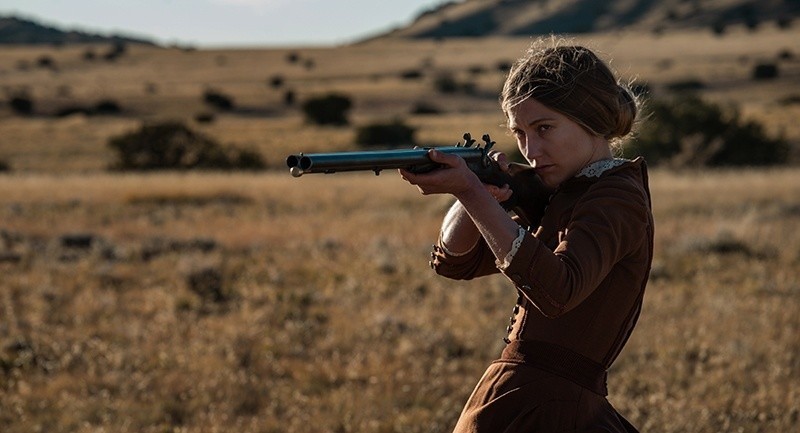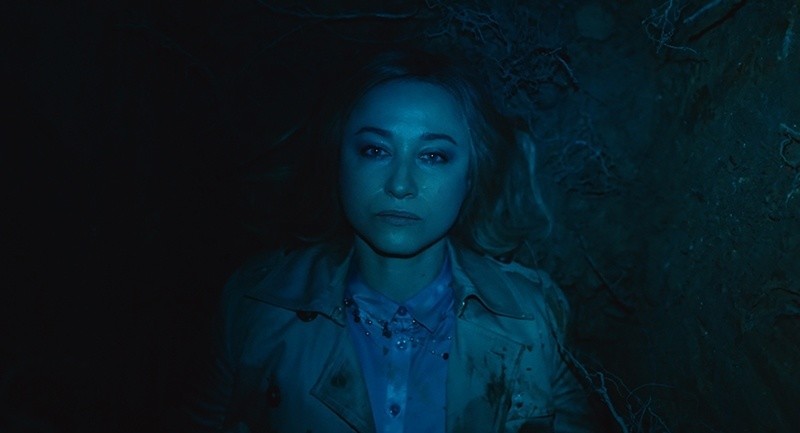“Chaos reigns” is the playful motto of the Austin-based Fantastic Fest, where fans are encouraged to mingle with filmmakers and critics for a full week of deliciously deranged cinema. Explaining the plot line of a Fantastic Fest selection could make you sound like you’ve gone mad, as you prattle on about literature-loving cannibals, Nazi-made zombies, and a coven of witches hiding in plain sight at a respected dance academy. But in the raucous lobby of the Alamo Drafthouse, where audiences raise a glass of beer between film slates and pugnacious debates, you’re in good company. This year, that good company included Steven Yeun, Danny McBride, Jack Black and Kyle Gass of Tenacious D, and beloved scream queens Jamie Lee Curtis and Jessica Harper.
Opening night kicked off with the US Premiere of two female-fronted horror movies: David Gordon Green’s “Halloween” and Emma Tammi’s “The Wind” (pictured below). The former is a radically retconning sequel that erases decades of Michael Myers mythos and remakes to tell a bracing tale of inherited trauma. The latter is a horror-Western inspired by historical accounts of women driven mad by the sinister sounds of relentless wind tearing across the inhumane terrains of the Wild West. In the first, Laurie Strode (Curtis) is told she’s paranoid, that after 40 years there’s no way the merciless Michael Myers will break free of his bonds and hunt her down. In the second, a once-pious plainswoman (Caitlin Gerard) believes the devil is literally scratching at her door. But her fears are dismissed by her confounded—and often absent—husband.

With “Halloween,” Green and his screenwriting partner Danny McBride embrace a modern horror aesthetic, leaning into mounting gore and contrasting their grim A-plot with B-plot bursts of comedic banter about babysitting and Banh Mi sandwiches. The careening in tone from grisly to goofy can be jarring, but audiences were nonetheless elated when Laurie lures Michael into a frightening finale. Yet, I screamed more watching Tammi’s taut tale of Western terror, where the sound design rattles with howls of wind and wolves and something scarier still. Winding back and forth through its heroine’s haunted timeline, “The Wind” willfully makes its audience uneasy as it unravels the story of this mysterious monster, then jolts us into yelps of terror with sharply chosen scares that linger long after you leave the theater. Needless to say, my returning to a drafty house with too many closets meant this double-feature did in any chance I had of a good night’s sleep.
After “Halloween,” the hottest ticket for Fantastic Fest badge holders was the North American Premiere of “Suspiria.” Luca Guadagnino’s daring remake of Dario Argento’s 1977 classic was the fest’s Sunday night secret screening. But by Sunday afternoon, the secret was out and the anticipation levels were sky-high. Those still reeling that anyone dared remake such an iconic bit of Italian horror will likely be relieved, as David Kajganich’s script shares only the faintest traces of the original story. Suzy (Dakota Johnson) is no longer a fretful and naïve ballerina, but a self-possessed and curious contemporary dancer, more in touch with her body and compelled by the strange secrets she uncovers at this Berlin-based dance company. Tilda Swinton (who definitely plays at least two roles in the film) brings an eerie humor to the role of charismatic choreographer Madame Blanc and spurred gasping chuckles from an enchanted audience. But tongues mostly wagged about Guadagnino’s distinctive blend of dance and gruesome violence. Flesh twists from beautiful to breaking. Naked flesh transforms from alluring to alarming as a climactic ritual moves into mayhem, which had audiences gasping and gulping in horror.
While I admire Guadagnino’s risks, I was underwhelmed by his “Suspiria.” In his previous works (“I Am Love,” “A Bigger Splash,” “Call Me by Your Name“), there’s a radiant humanity electric with tenderness and pain that pulls you full-hearted into the plight of its protagonists. But there’s a remoteness to these cool dancers that kept me from connecting both to their emotions and the terror that envelops them.

For me, a more moving tale of female trauma and rebellion can be found in “Fugue.” In 2016, Polish helmer Agnieszka Smoczynska wowed Fantastic Fest with her feature directorial debut “The Lure,” a moody and menacing musical about man-eating mermaids. Her much-anticipated follow-up doesn’t boast any such outlandish spectacle. Yet “Fugue” crackles with a society-skewering observational humor, raw drama, and an absurdist lilt. Gabriela Muskala stars as a woman who has suffered a dissociative fugue that’s erased all but the last two years of her life. She returns to her home, husband, and young son with no memory of or interest in them. But soon snags of memory begin to unfurl a mystery of who she was before and what caused her to break. Her journey is one of passion, regret, and forgiveness that had me cackling one moment and tearing up the next.
Fantastic Fest also boasted premieres of such buzzed-about festival darlings as “Burning,” the troubling drama South Korea has already chosen for its submission for the Best Foreign Language Oscar, “Mid90s,” Jonah Hill’s self-indulgent and shallow directorial debut, and “Destroyer,” the powerful Nicole Kidman-fronted crime-thriller that should have Karyn Kusama in the Best Director race this year. But for me, the best bit of Fantastic Fest is discovering a little-known film that’s very existence feels like a miracle. Sometimes a Christmas miracle.

Before Macaulay Culkin ran amuck in “Home Alone,” French director René Manzor made a better holiday adventure about a boy setting traps to fend off a vicious invader. Yet his “Deadly Games” (also known as “Game Over” or “3615 code Père Noël”) never got much notice outside of France, and didn’t even earn a DVD release there until this year. But 30 years since Manzor shot this charming holiday horror movie—with his son Alain Lalanne in the lead—”Deadly Games” finally got its North American Premiere, and before a vocally grateful audience.
Forget the safe Hollywood version. Manzor’s menacing madman is an unhinged mall Santa who slays a string of people before sneaking down Thomas’s chimney. And while this clever kid loves to play action-hero (dressing like Rambo and handcuffing his ever-game grandpa), he’s not relishing battling a violent grown-up. There are greater emotional stakes here than in “Home Alone,” as this kid is scared and fighting not just for the safety of himself and the sanctity of his house, but also for the life of his half-blind grandpa! Yet Manzor balances the drama and horror with an intoxicating whimsy, including imaginative confrontations that involve secret passages, a weaponized toy train, and a shrewdly employed suit of armor. Plus, there may be good news for those intrigued by this long-buried treasure. During the Q&A, an eager audience member asked if this repertory screening might mean “Deadly Games” could at long last get a US release on DVD or digital. Manzor shared that following the film’s first screening at the fest, he’d been approached by an interested distributor. So, you know what to ask Santa for this Christmas.

Of all the wild and wonderful films I’ve seen at Fantastic Fest this year, my favorite is “Madam Yankelova’s Fine Literature Club,” which from its opening image of dark skies and its vivacious score of smirking strings reminded me of the camp classic “Death Becomes Her.” Leaning into a love of soap opera stories and dark whimsy, co-writer/director Guilhad Emilio Schenker has crafted a twisted comedy about an all-female secret society that possesses a sinister ulterior motive for luring men to their weekly dinners. When one member begins to fall for her next victim—er—date, she must choose between love and her long-coveted promotion to Lordess status. The romance in the film is fun, alive with vulnerability and a fumbling passion. But what makes this Israeli offering such a standout is its sharply satirical humor that spins the wildest misconceptions about feminists into hilarious caricatures of humorless, prudish, man-hating spinsters. Through winking comedy, Schenker shows a deep understanding of the vexing societal pressure and threats women face. And he gives us glamorous, uncompromising, and violent anti-heroines who offer a deeply satisfying vengeance fantasy that sparks cathartic cackles, especially in these chaotic times.












